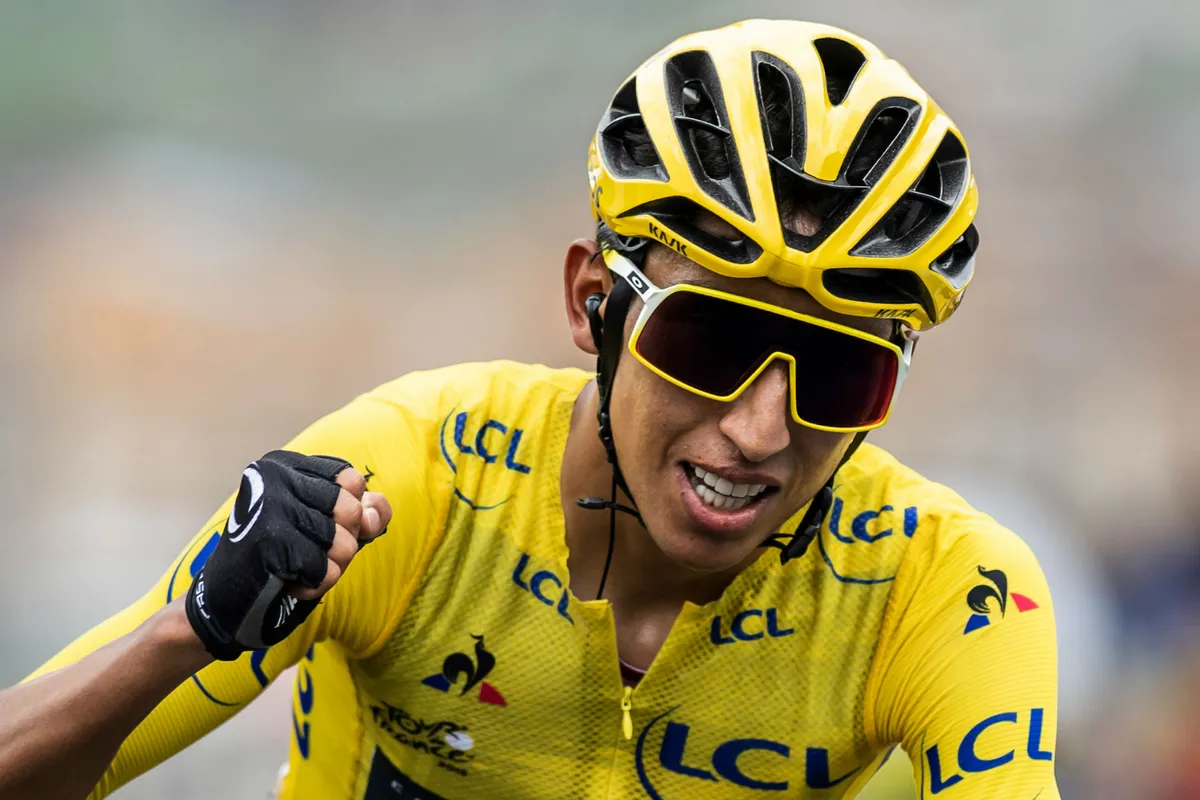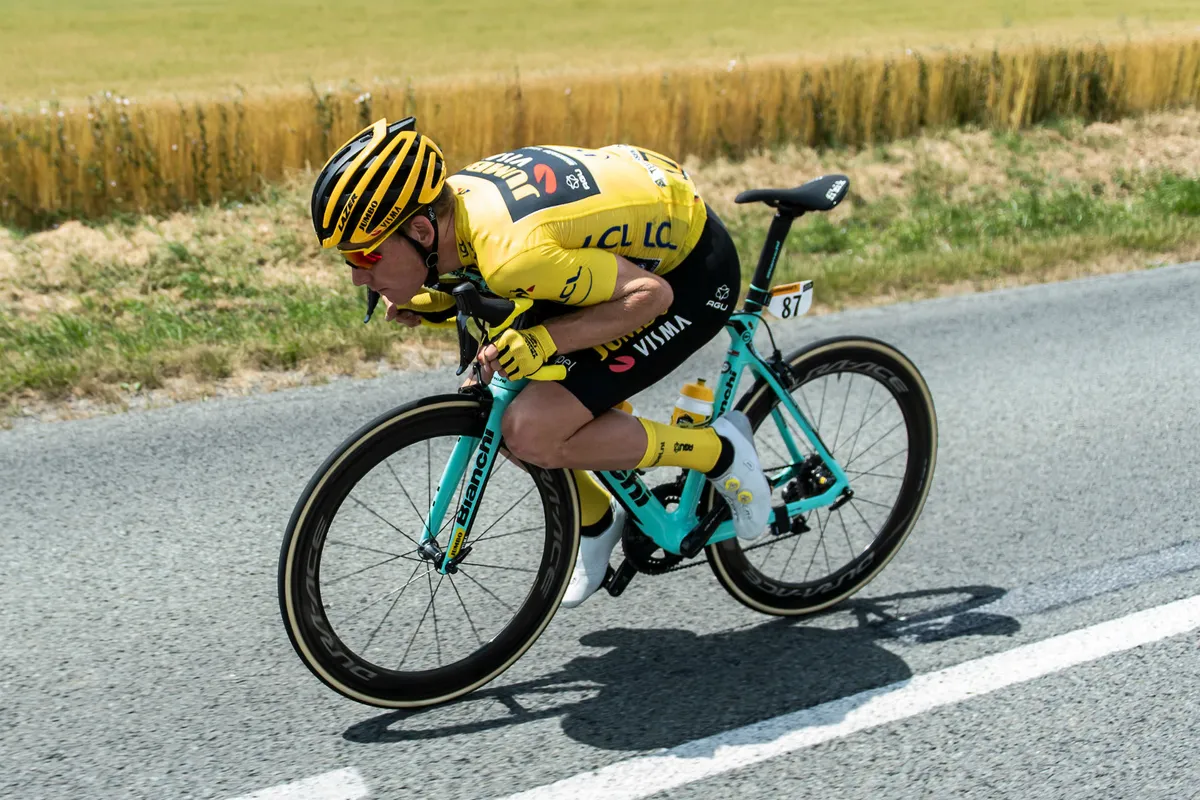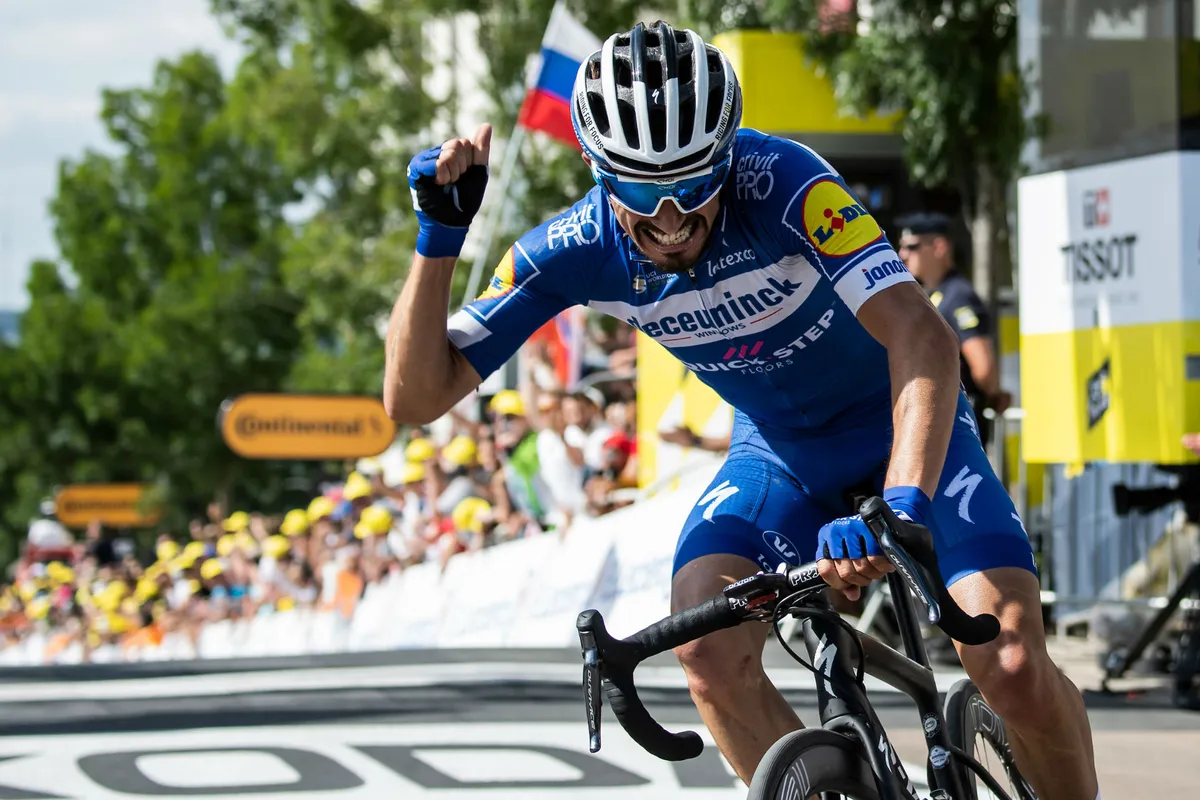After 23 days, 21 stages and more than 3,000km of racing, there could only be one winner of the 2019 Tour de France — but what were the key numbers behind Egan Bernal’s maiden Tour triumph?
The Colombian took the title in Paris, but an extraordinary three weeks saw Julian Alaphilippe light up the race throughout. Throw in elbow-to-elbow bunch sprints, hair-raising descents and brutally high climbs, and the 2019 race produced the kind of spectacle that only the Tour de France can.
The Tour’s official technology partner, NTT, has crunched the numbers from the 106th edition of cycling’s greatest race. Read on for some of the key facts and figures.
- The Tour tech of tomorrow | 3 predictions for the road bikes of the future
- Oliver Naesen rides final stage of Tour de France on steel Eddy Merckx bike
Top recorded speed: 101.5kph (63.1mph)
The fastest recorded speed at the 2019 Tour de France came on a white-knuckle descent of the Col de Vars by one of the peloton’s hard men.
Katusha-Alpecin’s Nils Politt – a top-five finisher at Paris-Roubaix and the Tour of Flanders this year – became the first rider to break the 100kph barrier according to the Tour’s official data feed, hitting a mind-boggling 101.5kph on a section of the descent with a negative 7 percent gradient.
The category one Col du Vars was the second of four ascents on stage 18, coming before the hors catégorie climbs of the Col d'Izoard and Col du Galibier. Politt eventually finished 44th on the stage, 21 minutes, 24 seconds behind Nairo Quintana.
Winner’s average speed: 40.58kph (25.2mph)
Egan Bernal conquered the Tour in a cumulative time of exactly 82 hours and 57 minutes. That gives him an average speed a shade above 40km/h for the 3,365.8km race.
For the numbers nerds, that's 0.35kph faster than Geraint Thomas’s average speed at last year's Tour.

Speed difference between first and last place: 2.11kph (1.3mph)
At the other end of the scale, EF Education First’s Dutchman, Sebastian Langeveld, was this year’s Lanterne Rouge – the last rider on the general classification.
Langeveld’s cumulative time was four hours, 34 minutes and 23 seconds slower than Bernal’s – making his average speed 2.11kph slower.
Average climbing speed: 20.6kph (12.8mph)
Of course, the real difference in the 2019 Tour was made when the road pointed skywards – not least in the Pyrenees and the Alps.
Bernal was in imperious form in the mountains, following in the footsteps of many of his Colombian countrymen — a nation that has produced many fine climbers — and proving he has a head for heights.
Over climbs including the Col du Galibier, Col du Tourmalet and, most tellingly, the Col de l’Iseran, Bernal recorded an average climbing speed of 20.6kph.
Fastest Col du Galibier ascent: 22:28 minutes
Talking of Colombian climbers, while Bernal claimed the yellow jersey, there was also success for his countryman Nairo Quintana.
The Movistar rider ultimately finished eighth overall, failing to make a challenge on the podium, but he did claim a stage win in Valloire – and broke a long-standing Tour record in the process.
En-route to the finish, Quintana climbed the iconic Col du Galibier in 22 minutes and 28 seconds (measured over the final 8.5km from the Col du Lautaret). That's a whole minute faster than the mark Frank Schleck set in 2011.

Number of different individual stage winners: 15
Quintana was one of 15 riders to claim a stage win in this year’s Tour de France – two more than there were in last year’s race.
Caleb Ewan led the way – his victory on the Champs-Elysees was his third of the race – while Great Britain’s Simon Yates won twice in the mountains.
From Mike Teunissen’s opening stage win in Brussels to Ewan’s final triumph, nine different nationalities stood on the podium as individual stage winners in this year’s race.
Number of stages won by overall winner: 0
Despite winning the race overall, Bernal wasn’t among those 15 riders. The Colombian earned his maiden Tour de France triumph without winning a stage.
Chris Froome was the last rider to do that (in 2017), though the four-time champion does have seven stage wins to his name in total.
Number of riders who wore the yellow jersey: 4
Bernal was one of four riders to wear the yellow jersey in all, having claimed the race lead after the shortened stage 19 on the Col de l’Iseran.
Bernal took over from Julian Alaphilippe, who claimed 14 yellow jerseys across two spells as race leader.
In between, Italian Giulio Ciccone led the race for two stages while the only other rider to pull on the maillot jaune was stage one winner Mike Teunissen.

Age of winner: 22y, 196d
Bernal’s triumph not only made him the first Colombian to win the Tour de France, but he is also the youngest winner for 110 years.
Francois Faber was 22 years and 187 days old when he won the Tour in 1909 – just nine days younger than Bernal – while the youngest champion remains 19-year-old Henri Cornet in 1904.
Number of classifications won by Egan Bernal: 2
Bernal’s age means he not only won the yellow jersey but the white jersey for best young rider, too — only the fifth time since the youth classification was introduced in 1975 that has happened.
Bernal joins Laurent Fignon (1983), Jan Ullrich (1997), Alberto Contador (2007) and Andy Schleck (2010) in the record books.
Number of finishers: 155
Some 176 riders set out from Brussels for the 106th Tour de France on Saturday 6 July, with 155 making it all the way to the Paris finish line.
Thibaut Pinot, who had to climb off the bike during stage 19 having been in overall contention, was the last of 19 riders to abandon this year’s race.
A further two – Tony Martin and Luke Rowe – were disqualified after an altercation on the way to the stage 17 finish line.
